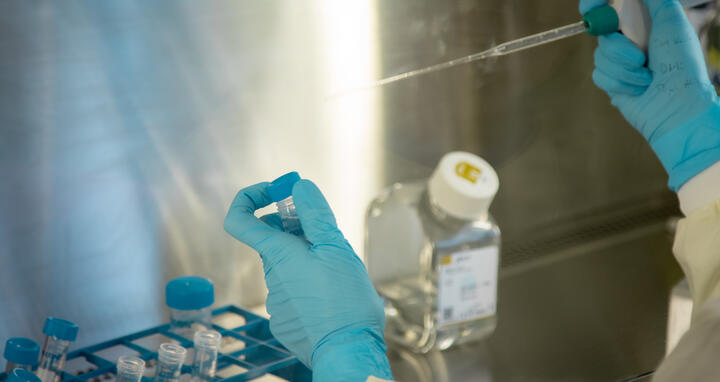How metabolites and proteins shake hands
How macromolecules such as proteins, small molecules (nucleic acids and metabolites) and their alterations interact in networks plays an important role in cancer and human developmental diseases. By studying how metabolites and proteins “shake hands,” Dr. Ilaria Piazza was able to discover new enzyme activities. Such interactions between proteins and metabolites regulate cellular chemical reactions as well as signaling functions that explain how cells communicate in a tissue or an organ. “My research aims to achieve a unified view of different high-throughput approaches and omics sciences such as metabolomics, proteomics and genomics,” Piazza says. “My lab at the MDC will incorporate the network of interactions between proteins and metabolites into this equation, what I call ‘allosteric proteome.’”
Often, these basic processes get out of control in cancer and developmental diseases. Piazza’s new perspective thus sets the ground for understanding the molecular mechanisms of many diseases, including cancer and cardiovascular and metabolic diseases, and for developing preventive and therapeutic strategies. This includes identifying drug targets and advancing regenerative medicine approaches.
The path to a new method called “LiP-SMap”
Lego was Piazza’s favorite toy as a child and, influenced by her father who had a talent for electronics, she first studied engineering in Milan. But soon she discovered her interest in biology, with a clear goal in mind to “do something useful” with her life. So she switched to biochemistry and carried out research at the University of Cambridge in the United Kingdom before completing her PhD at the European Molecular Biology Laboratory (EMBL) in Heidelberg. During these formative years, she was interested in understanding how the information encoded in the DNA molecules of the cells is read in a controlled way.
She realized, however, that cells are very complex systems and turned back to engineering in order to understand the underlying mechanisms. At the Swiss Federal Institute of Technology (ETH) in Zurich she used the mass spectrometer to measure the mass – i.e., the identity and amounts – of all proteins present in cells and tissues. Piazza even developed a new research method called limited proteolysis–small-molecule mapping, or LiP-SMap for short. It allows scientists to systematically map how all the proteins present in a cell interact with the metabolites.
“This is important because proteins carry out specific tasks in the cell such as building structures and catalyzing chemical reactions,” Piazza explains. “They do that by constantly exchanging ‘building blocks’ – metabolites – within the external microenvironment of a tissue. The mass spectrometry-based LiP-SMap method provides a new tool for exploring interactions between proteins and metabolites that were not accessible before. We can predict which proteins change their functions, and where the metabolite binding region is located in the protein structure. Such knowledge enables us to devise a strategy for controlling this protein-metabolite network.”
Her lab at the MDC
In May, Piazza will join the MDC as a junior group leader in the “Cardiovascular & Metabolic Diseases” research area. Her long-term research goal as a PI is to characterize the binding between protein and metabolites, as well as the alterations of the interactions between proteins and metabolites. She will address fundamental biological questions that are still largely unanswered and have clear medical implications. “This new proteomic technology enables us to discover and characterize new drugs,” Piazza explains. “For instance, we will be able to find out which protein binds to a certain compound, without the need of customized tests or without chemically altering the drug, thereby changing its properties.”
Joining the MDC was not a difficult choice. “Berlin is a growing hub for the life sciences in Europe, especially for systems biology, so it is a good place to be and to start my own lab,” Piazza says. But the city of Berlin might have also played a part in her choosing the MDC. “I am excited by the prospect of its internationality, open-mindedness and history – and even by its contradictions,” Piazza says. “It seems to be the place where exciting things are happening.”






